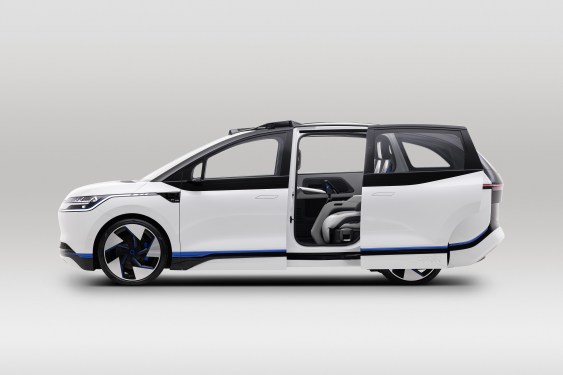Chinese Search Engine Giant Invests in AI and Autonomous Vehicle Technology
In a significant move towards the future of transportation, Baidu, the Chinese search engine giant, has unveiled a new all-electric robotaxi that it plans to deploy at scale across China. The Apollo RT6 EV is a cross between an SUV and a minivan, featuring a detachable steering wheel that adds space for seating, vending machines, desktops or gaming consoles.
Cost-Effective Production
Developing the battery-electric architecture in-house has helped trim production costs to a manageable $37,000 per unit. Baidu claims that recent advances in manufacturing have cut production costs, allowing it to eventually build and operate tens of thousands of robotaxis at scale across Chinese megacities including Beijing, Shanghai, Guangzhou, and Shenzhen by next year.
"This massive cost reduction will enable us to deploy tens of thousands of AVs across China," said Robin Li, Baidu’s CEO and co-founder, at the Baidu World 2022 technology conference. "We are moving toward a future where taking a robotaxi will be half the cost of taking a taxi today."
Apollo RT6 Features
The Apollo RT6 comes with L4 autonomous driving capability, featuring 38 sensors – including a dozen cameras and eight lidar – for navigating complex streetscapes. The sunroof stretches the full length of the car to allow natural light into the cabin.
Commercialization of Robotaxi Business
Baidu has begun charging fares in Beijing for driverless rides in its fifth-generation robotaxis, marking a significant step towards commercializing its robotaxi business. The company aims to expand this service beyond China to 65 cities by 2025 and 100 cities by 2030.
Key Statistics
- Production cost: $37,000 per unit
- Autonomous driving capability: L4
- Number of sensors: 38 (12 cameras and 8 lidar)
- Cities planned for expansion: 65 by 2025, 100 by 2030
Impact on the Transportation Industry
The introduction of Baidu’s all-electric robotaxi marks a significant milestone in the development of autonomous vehicles. With its plans to deploy tens of thousands of robotaxis across China, Baidu is poised to revolutionize the transportation industry.
Conclusion
Baidu’s unveiling of the Apollo RT6 EV and its plans to deploy tens of thousands of robotaxis across China are major steps towards a future where autonomous vehicles become the norm. As the company continues to innovate in AI and autonomous vehicle technology, it will be interesting to see how this affects the transportation industry as a whole.
Recommendations
- Follow Baidu’s progress on its robotaxi deployment
- Stay up-to-date with the latest developments in autonomous vehicle technology
- Consider investing in companies working towards commercializing autonomous vehicles
Baidu’s Robotaxi Business: A Closer Look
Baidu’s robotaxi business is a significant part of its plans to revolutionize the transportation industry. With its fifth-generation robotaxis already being used in Beijing, and plans to expand to 65 cities by 2025 and 100 cities by 2030, Baidu is poised to make a major impact.
Key Features
- Autonomous driving capability: L4
- Number of sensors: 38 (12 cameras and 8 lidar)
- Cities planned for expansion: 65 by 2025, 100 by 2030
The Future of Transportation: Autonomous Vehicles
Autonomous vehicles are the future of transportation. With companies like Baidu leading the way in AI and autonomous vehicle technology, it’s exciting to see how this will shape the industry.
Key Statistics
- Production cost: $37,000 per unit
- Autonomous driving capability: L4
- Number of sensors: 38 (12 cameras and 8 lidar)
- Cities planned for expansion: 65 by 2025, 100 by 2030
Investing in the Future of Transportation
As the transportation industry continues to evolve, it’s essential to stay informed about the latest developments. Consider investing in companies working towards commercializing autonomous vehicles.
Key Features
- Autonomous driving capability: L4
- Number of sensors: 38 (12 cameras and 8 lidar)
- Cities planned for expansion: 65 by 2025, 100 by 2030
Conclusion
Baidu’s unveiling of the Apollo RT6 EV and its plans to deploy tens of thousands of robotaxis across China are major steps towards a future where autonomous vehicles become the norm. As the company continues to innovate in AI and autonomous vehicle technology, it will be interesting to see how this affects the transportation industry as a whole.
Recommendations
- Follow Baidu’s progress on its robotaxi deployment
- Stay up-to-date with the latest developments in autonomous vehicle technology
- Consider investing in companies working towards commercializing autonomous vehicles



